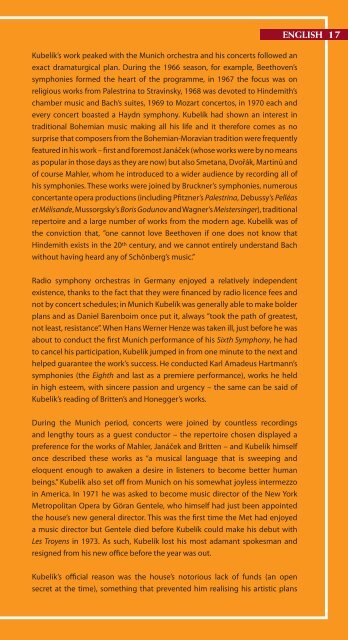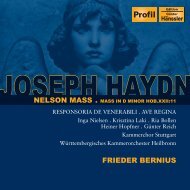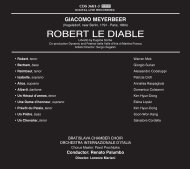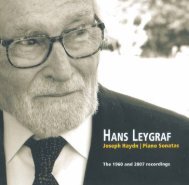RAFAEL KUBELÍK
RAFAEL KUBELÍK
RAFAEL KUBELÍK
Sie wollen auch ein ePaper? Erhöhen Sie die Reichweite Ihrer Titel.
YUMPU macht aus Druck-PDFs automatisch weboptimierte ePaper, die Google liebt.
Kubelík’s work peaked with the Munich orchestra and his concerts followed an<br />
exact dramaturgical plan. During the 1966 season, for example, Beethoven’s<br />
symphonies formed the heart of the programme, in 1967 the focus was on<br />
religious works from Palestrina to Stravinsky, 1968 was devoted to Hindemith’s<br />
chamber music and Bach’s suites, 1969 to Mozart concertos, in 1970 each and<br />
every concert boasted a Haydn symphony. Kubelík had shown an interest in<br />
traditional Bohemian music making all his life and it therefore comes as no<br />
surprise that composers from the Bohemian-Moravian tradition were frequently<br />
featured in his work – first and foremost Janáček (whose works were by no means<br />
as popular in those days as they are now) but also Smetana, Dvořák, Martinū and<br />
of course Mahler, whom he introduced to a wider audience by recording all of<br />
his symphonies. These works were joined by Bruckner’s symphonies, numerous<br />
concertante opera productions (including Pfitzner’s Palestrina, Debussy’s Pelléas<br />
et Mélisande, Mussorgsky’s Boris Godunov and Wagner’s Meistersinger), traditional<br />
repertoire and a large number of works from the modern age. Kubelík was of<br />
the conviction that, ”one cannot love Beethoven if one does not know that<br />
Hindemith exists in the 20 th century, and we cannot entirely understand Bach<br />
without having heard any of Schönberg’s music.”<br />
ENGLISH 17<br />
Radio symphony orchestras in Germany enjoyed a relatively independent<br />
existence, thanks to the fact that they were financed by radio licence fees and<br />
not by concert schedules; in Munich Kubelík was generally able to make bolder<br />
plans and as Daniel Barenboim once put it, always ”took the path of greatest,<br />
not least, resistance”. When Hans Werner Henze was taken ill, just before he was<br />
about to conduct the first Munich performance of his Sixth Symphony, he had<br />
to cancel his participation, Kubelík jumped in from one minute to the next and<br />
helped guarantee the work’s success. He conducted Karl Amadeus Hartmann’s<br />
symphonies (the Eighth and last as a premiere performance), works he held<br />
in high esteem, with sincere passion and urgency – the same can be said of<br />
Kubelík’s reading of Britten’s and Honegger’s works.<br />
During the Munich period, concerts were joined by countless recordings<br />
and lengthy tours as a guest conductor – the repertoire chosen displayed a<br />
preference for the works of Mahler, Janáček and Britten – and Kubelík himself<br />
once described these works as “a musical language that is sweeping and<br />
eloquent enough to awaken a desire in listeners to become better human<br />
beings.” Kubelík also set off from Munich on his somewhat joyless intermezzo<br />
in America. In 1971 he was asked to become music director of the New York<br />
Metropolitan Opera by Göran Gentele, who himself had just been appointed<br />
the house’s new general director. This was the first time the Met had enjoyed<br />
a music director but Gentele died before Kubelík could make his debut with<br />
Les Troyens in 1973. As such, Kubelík lost his most adamant spokesman and<br />
resigned from his new office before the year was out.<br />
Kubelík’s official reason was the house’s notorious lack of funds (an open<br />
secret at the time), something that prevented him realising his artistic plans

















